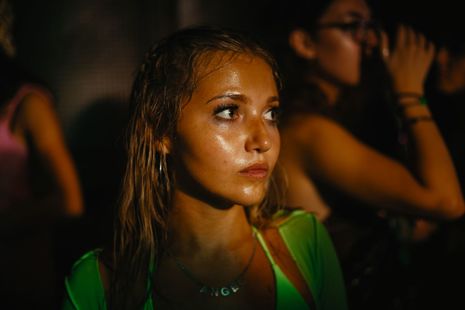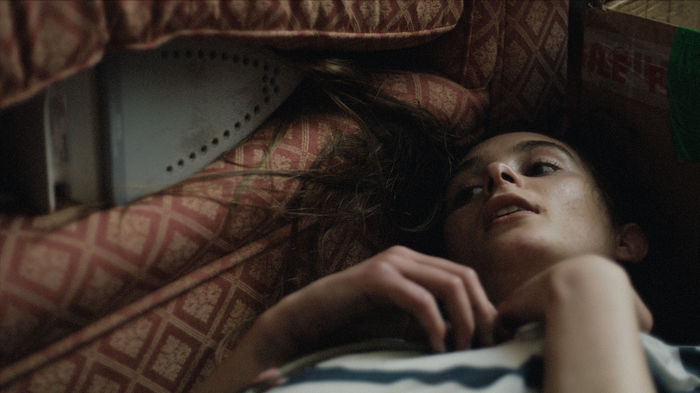How to Have Sex offers a powerful lesson for Girls and Boys alike
Streets like a jungle, so call the police, following the herd down to Greece…

“If you don’t get laid on this holiday, then you never will!” one of Tara’s friends jokingly tells her in the airport on their way to Malia. Just like that, the stakes of this film are set, and the facade of neon lights and drunken nights slowly begins to peel away, revealing a much darker side to the sun, sea, and, most importantly, sex.
Molly Manning Walker’s electric feature debut is a masterclass in balancing realism with extremity. It tells the story of three best friends celebrating the end of Year 11 with a girls’ trip to Greece – but what becomes the “best holiday ever” for some of them is fraught with tension and trauma for our protagonist, Tara (The Dumping Ground alumna, Mia McKenna-Bruce). All three actresses are astoundingly talented, and perform probably the most realistic drunk acting I’ve ever seen on screen. In fact, their performances hardly even feel like performances; at times, it’s almost like you’re watching real people through a peephole, giving the film an almost voyeuristic quality. This quickly becomes disconcerting, not just because you feel like you’re getting too much insight into someone else’s life, but because, at times, it feels like you’re seeing your own life reflected back at you.
“The facade of neon lights and drunken nights slowly begins to peel away”
Fitting, then, that How to Have Sex paints a distinctly realistic picture of the way any night out can very quickly go south – that all too familiar feeling when the lights get just a bit too bright, the music gets just a bit too loud, and suddenly your friends are nowhere to be seen. At several points, all sound is drowned out, and all we can hear are McKenna-Bruce’s panicked and shallow breaths. When the recognisable face of stranger-turned-next-door-neighbour Paddy (Samuel Bottomley) appears, the breaths only get more panicked.
The beauty of this film is that it exposes the reality of unbalanced power dynamics and patriarchal double standards, using a setting where both of those things are turned up to full capacity. The beaches of the Greek party islands during the summer provide a kind of gender divide usually only seen on reality TV shows like Love Island. Thousands of girls’ trips collide with thousands of lads’ holidays, and the result is nothing short of chaos. Everyone is scantily clad and everyone is drunk, but no one is equal. Everyone might be sexualised, but it’s still the men who hold the power.
“Everyone might be sexualised, but it’s still the men who hold the power”
This power is impressively and disturbingly depicted by cinematographer Nicolas Canniccioni with long lasting close-ups of bodies and skin and a constant, lingering focus on characters’ eyes; there is an implicit sense of danger created when we are forced to watch a man watch a woman, and How to Have Sex understands this perfectly. This film is defined not by what is said or done, but rather what is not said – there is a subtlety to the violence, the way it is brushed off, ignored or, at worst, willingly denied. The conversations that should occur before, during, and after sex are entirely absent, and what we are left with is a shining example of how not to do what the title suggests.
Yet the film doesn’t seek to set up a false dichotomy of male guilt and female innocence – it also explores the way patriarchy forces women to hurt each other. Tara’s “best mate” Skye (Lara Peake) makes jokes about her virginity in a room full of men, insults the man Tara fancies so she can try and have him for herself, and chooses to interpret her friend’s disappearance as a sexual victory and not as a warning sign. By turning real people into commodities, the culture of these sex-driven holidays doesn’t just make men compete for women, but women compete against each other, and in the end nobody wins.
It’s easy to see how some viewers might argue that this film doesn’t really end up saying much, given that it ends without any overwhelming conclusion or dramatic final scene… but I think that’s exactly the point. Manning Walker doesn’t force an overly didactic point onto the audience, she simply creates a hyper-realistic, brutally honest story, and allows it room to breathe. The end result is a film that encourages and guides you to re-evaluate your own experiences, and your own place in these stories, whatever those may be. As for me… I walked back from the cinema alone, more aware than usual of the way my jeans sat on my hips, and of the gaze of every stranger who walked past.
How to Have Sex is in cinemas now
 News / Cambridge postgrad re-elected as City councillor4 May 2024
News / Cambridge postgrad re-elected as City councillor4 May 2024 News / Gender attainment gap to be excluded from Cambridge access report3 May 2024
News / Gender attainment gap to be excluded from Cambridge access report3 May 2024 News / Some supervisors’ effective pay rate £3 below living wage, new report finds5 May 2024
News / Some supervisors’ effective pay rate £3 below living wage, new report finds5 May 2024 News / Academics call for Cambridge to drop investigation into ‘race realist’ fellow2 May 2024
News / Academics call for Cambridge to drop investigation into ‘race realist’ fellow2 May 2024 Comment / Accepting black people into Cambridge is not an act of discrimination3 May 2024
Comment / Accepting black people into Cambridge is not an act of discrimination3 May 2024





